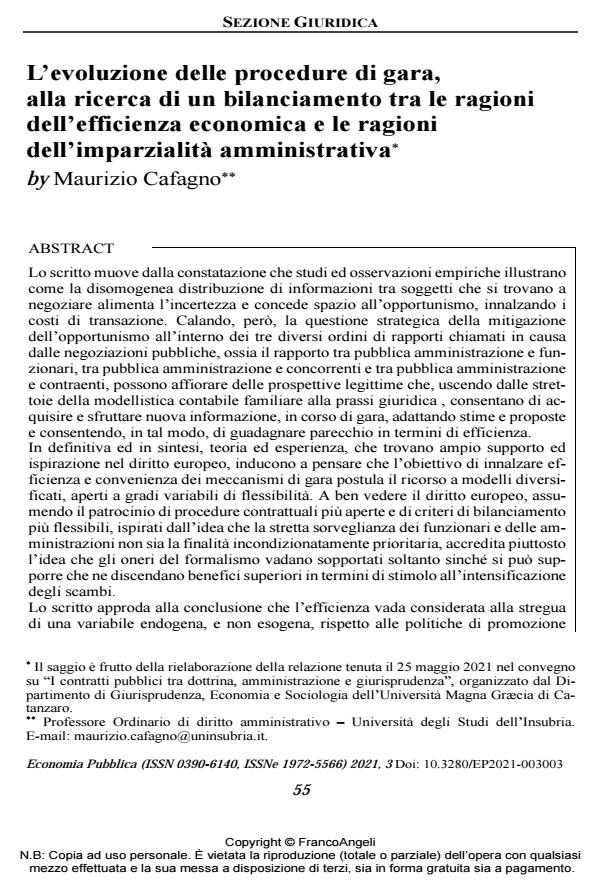The evolution of tendering procedures, seeking a balance between the reasons for economic efficiency and the reasons for administrative impartiality
Journal title ECONOMIA PUBBLICA
Author/s Maurizio Cafagno
Publishing Year 2021 Issue 2021/3 Language Italian
Pages 26 P. 55-80 File size 308 KB
DOI 10.3280/EP2021-003003
DOI is like a bar code for intellectual property: to have more infomation
click here
Below, you can see the article first page
If you want to buy this article in PDF format, you can do it, following the instructions to buy download credits

FrancoAngeli is member of Publishers International Linking Association, Inc (PILA), a not-for-profit association which run the CrossRef service enabling links to and from online scholarly content.
The paper starts from the observation that studies and empirical observations illustrate how the uneven distribution of information between subjects who find themselves negotiating feeds uncertainty and allows space for opportunism, rais-ing transaction costs. However, by lowering the strategic question of the mitiga-tion of opportunism within the three different orders of relationships called into question by public negotiations, i.e. the relationship between public administra-tion and officials, between public administration and competitors and between public administration and contractors, they can show the emergence of legiti-mate perspectives which, emerging from the bottlenecks of accounting modeling familiar to legal practice, allow the acquisition of new information, during the tender process, adapting estimates and proposals and, in this way, it is opportune to gain a lot in terms of efficiency. Ultimately and in synthesis, theory and experience, what a right to find support and inspiration in the European, lead us to think that the objective of achieving efficiency and advantages of the tender mechanisms postulates the use of diver-sified models, open to varying degrees of flexibility. If we look closely at Euro-pean law, assuming the patronage of more open contractual procedures and more flexible criteria, inspired by the idea that the strict supervision of officials and administrations is not the unconditional priority, it rather accredits the idea that the formalism should only be tolerated as long as it can be assumed that there will be superior benefits in terms of stimulating the intensification of ex-changes. The paper comes to the conclusion that efficiency should be considered as an endogenous, and not exogenous, variable with respect to the policies to promote competition. Therefore, it would be useful to validate also in our legal system a criterion of freedom of procedural forms, at least for the so-called excluded con-tracts, which are not always and not necessarily required to be translated into tender procedures, given the possibility of access to judicial protection for the as-pirant who can prove that he has suffered the harmful and discriminatory ef-fects of the violation of the general principles.
Keywords: public procurement, tender procedures, competition law
Jel codes: K23
Maurizio Cafagno, L’evoluzione delle procedure di gara, alla ricerca di un bilanciamento tra le ragioni dell’efficienza economica e le ragioni dell’imparzialità amministrativa in "ECONOMIA PUBBLICA " 3/2021, pp 55-80, DOI: 10.3280/EP2021-003003